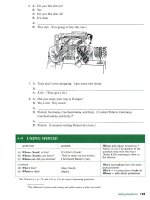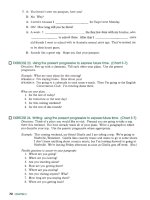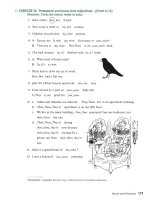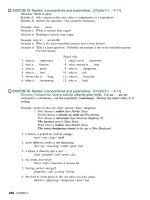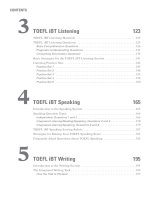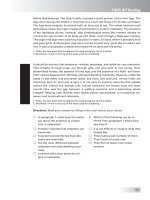Ship or sheep third edition part 22 potx
Bạn đang xem bản rút gọn của tài liệu. Xem và tải ngay bản đầy đủ của tài liệu tại đây (474.81 KB, 7 trang )
UN|T58
lvlvan ll7
'
-al
pair
words
a
Listen and repeat the words. Then Iisten and
repeat.
b
You
will hear five words from
each
minimal
pair. For
each
word,
write I
for /b/
(sound
I) or 2 for
lvl
(sound
2).
EXAMPLE Pair I: I,2,1,2,
I
'
-al
oair sentences
c
Listen to the minimal
pair
sentences.
d
Listen to six of the sentences
and
write I for lbl
(sound
l) or 2 for
lvl
(sound
2).
e Sentence stress
Listen to the minimal
pair
sentences
again and underline the two
strongly stressed
words in each sentence
(on
page
136).
f
Tick
the
words a), b) or c) that
you
hear in the sentences.
r
a)
lift
I
b)
Iived
tr
2 a)half
I
b)
halve
tr
3 a)
fast
tr
b)
vast
I
4
a) boat
I
b)
vote
tr
5 a) bolts
I
b) volts
tr
6a) safe
I
b) save
tr
:
-
alogue
A
I
a
First
practise
the
target sound /v/
in some of the words from the
dialogue.
Read the words aloud or
visit the website
to
practise.
view
lived five of have love village
valley very Vander
lovely
Victor living
arrived
Vivienne
b
lntonation
in
statements
Intonation
usually
goes
down at the end of a
statement. Listen to the
intonation
in
this
dialogue. Then
practise reading it
aloud.
Record
your
voice to compare
your intonation and
production
of the target
sound
with the recording.
i
-:
VleW
vrvtENNE: Has the Vander family
lived here for very lgng, Victor?
VtCToR:
Five
and
a half
yea,ls,
Vivienne.
We
arived
on the first of February.
vlvlENNE: What a
lcruely view
you
have!
VICTOR:
Y€s lt's fabulous.
vtvtENNE: Lookl You can see the vil,lage
down in the
ya{ey
vlCTOR:
Yes. We
just
lsve living here because of
the
view.
1,!!Q
unq 58 /r,'/
van
4
Stress ancl
intonation
czz
a
Listen to
this
description
and draw a down arrow on the last strong
stress in
each
sentence.
Check
your
answers and then
practise
reading
the description
aloud.
Record your voice
to compare
your production
o,
the target
sound
with
the recording.
This is a
photograph
of a
fat farmer
arriving at a village.
The village
is
in
a
valley.
The farmer's driving
a
van.
It's
the seventeenth of November.
It's a fine
day
but it's very
cold.
Some of the
leaves
have fallen from the vine in the foreground
of the
photograph.
Remember
that
intonation
often
goes
down at the end of
statements,
short answers,
WH questions, questions
with
'or'.
Match these
questions
and answers, and draw down arrows on the last
strong stress.
EXAMPLE
\&ihat month is it in this
phOtograph?
NoVember
I \Mho's
glriving
the van?
A
vine
2 How many leaves have fallen from
the
vine?
3 V\here
do
the villagers live?
4 Is the van
leaving or alriving?
Arrirrin
o
Five
In the valler
5 In
the
foreground
of the
plfOtograph,
is it a vine or a fir
tree?
Four
6
Near
the village are there four or five fir trees? The farmer
c73 Listen
to check
your
answers, then
practise
saying the
questions
and
answers.
5 Spelling
Look back over this unit at words with the target sound, and write what
you
noticed about how to spell the sound
/v/.
lwlwindow
r59
at do
you
want
for
your
birthday?
atever
you
want to
give
me.
"
atch? A u'allet? um A wig?
A
n'etsuit? A w'elcome
:- ::? .
. . er A woolly
vest?
Some wine?
A
grape
vine?
atever.
.€
b-'
@r
-:'get
sound /wi
-
,
a First
practise
the sound /v/
(see
page
135). Listen and repeat.
b Make
your lips round
and
hard to
make the short target sound
/w/.
Listen
and
repeat.
.
c Listen and
repeat the two
sounds:
lvlandlwl.
\i-
,,
z-<
_
L/'
i
)l
t
\
,'i
'nimal
pairs
Sound
I Sound
2
I
?
e'
JE
vest
west
That's the vest. That's the
west.
vet
wet
The dog's vet.
The dog's wet.
vtne
This
is
my best vine.
wtne
This is my best wine.
veil whale
It's a blue veil.
lt's
a
blue whale.
-ral
pair
words
-
a
Listen and
repeat the words.
,
b You will
hear
five
words from each
minimal
pair.
For
each
word, write
for
/v/
(sound
l)
or
2 for lwl
(sound
2).
EXAMPLE
Pair 1: I,l,1,2,2
140
UNIT 59
/w/
window
Minimal
pair
sentences
I)4a
c Listen
to the minimal
pair
sentences.
pan
d
Listen to five of the sentences and write I for /v/
(sound
l)
or
2 for lwl
(sound
2).
D4a
e Sentence stress
Listen to the minimal
pair
sentences again and underline the two
strongly stressed words in each sentence
(on
page
139).
EXAMPLE This is my best vine.
Ds
f Tick
the words a) or b) that
you
hear in the sentences.
r a) vine
I
b) wine
I
2a)Y
I
b)we
3
a) veal
I
b) wheel
4 a) verse
|-J
b)
worse
5
a)veils
tr
b)whales
!
6a)vet
I
b)wet
I
5
Dialogue
$
a
first
practise
the target sound
/w/
in words from
the dialogue below.
-
Read
the words aloud
or visit
the
website
to
practise.
well what wet walk
warm
with white
wine went
walked
woods
wild
sweet William
Wednesday
wasn't
wearing walnut railway
quiet
quickly
twenty squirrels
wonderful
Winona
afterwards
uc b Sentence stress
Listen to the dialogue,
paying
attention
to
the
target sound. Then
read
the dialogue
and
guess
which
words are strongly stressed in each
sentence. The number
in brackets tells
you
how many words will be
strongly
stressed
in
that line. The first line has been done as an exampi.
A walk in
the
woods.
VIRGINIA:
(2)
| saw . . William
again on Wednesday, Winona
WINoNA:
(4)
Oh?
William
again
(Winono
loughs.)
Well, what happenec-
VIRCINIA:
(a)
We went for
a
lovely
walk in the woods.
wINONA:
(6)
Oh? In the wet? Wasn't it
very
wet
on Wednesday?
VIRCINIA:
(6)
lt wos very
cold and wet But we were wearing very warm
clotf
=
(a)
and
we walked quickly
to keep warm.
WINoNA:
(6)
ls
that the
woods next
to the railway? lt's not very
quiet.
VlRclNlA:
(6)
Yes.
But further away from the railway it was very
quiet
(a)
and there were wild
squirrels everywhere.
We
counted
(2)
twenty squirrels.
WINONA:
(5)
Twenty
squinels? And what did
you
do
for lunch?
(2)
A
picnic
with the squirrels?
tr
T
UNIT 59
lu'l window
141
VIRCINIA:
(5)
lt was
too wet. Afterwards we went
to a restaurant. lt was
(6)
wvelve o'clock. We had walnut
cake and sweet white wine
(
I
) lt was wonderful
wINONA:
(3)
So? William again Well ?
VIR6tNtA:
(l)
Well?
(Virginio
ond Winono lough.)
c
Check
your
answers
by listening to the dialogue
again. Then check in the
key.
d
Practise
reading
the dialogue aloud. Record your voice
to compare
your
production
of the sentence
stress and the target sound with the
recording.
"
:ss
and intonation
a
Intonation
usually
goes
down at the end
of
WH
questions
and short
answers.
EXAMPLE
\Mhere was it
ouiet?
In
the
woods.
Match
the answers
(a-h)
to the
questions
(l-B)
about the dialogue.
Then
Iisten to check and repeat.
1 \Mhere
was it
quiet?
a
The squirrels.
2
\Mhat did they watch?
b Ever).where.
3 \Mhat did
they drink?
c To keep warm.
4 lVhere
were the squirrels?
d In the woods.
5 \Mhy
did they walk
quickly?
e TWelve o'clock.
6 \^Ihat
did they eat for lunch?
f Went for a walk.
7 \Mhat
time did they have lunch? g
Walnut cake.
8 \A/hat
did
William
and Virginia
do on
Wednesday?
h Sweet white wine.
Practise reading
the
questions
and answers
aloud.
Record your voice
to
compare your
production
of the intonation with
the
recording
b lntonation:
old information/new information
Notice that intonation
in I4lH
questions
can change when we are talking
about
old
information,
e.g. the first time we
ask somebody's
name,
we
ask:
'\A4rat's
your
name?' This is new information.
But if I then forget the
name
and ask again, I ask:
'What's
your
name?' because I am asking
about
old
information
that has
already been
given.
The intonation
goes
up
to show that this is something we have
already shared.
Listen
to
Winona, later
in the day, askingVirginia
some
questions
about
information
they had shared.
\A/here were
the squirrels exaeltly?
\dhat
time did
you
say
you
had lunch?
\Mhy
did
you
walk
quickly?
142
uNlT 59
/rr
i
rvindorv
This
is
all old
information
that Virginia and
Winona
had already
shared
so
the intonation
goes
up.
Now listen to
Winona asking
for
new information.
\A/hat did
you both talk about?
\Mhen did
you
arrange
the
meeting?
Listen and
mark
whether these
questions are old information
or
new
information.
The
first two have
been done
as examples.
Mhat did
you
say
you
drank?
old informotion
2 \Mhat colour
did
you
wear? new
informotion
3
What did
Victor say?
a Why did
you
walk
quickly?
5
What did
Victor wear?
6 lVhere did
you
go
with Victor?
ru'
c
Linking
/w/
The sound
/w/
is used
in rapid spoken
English to
link other sounds.
TI ,
sound /w/
Iinks
words ending
in /u/ or
lol
,
e.g. who,
you,
how,
go,
hel.
when the next
word begins
with a
vowel.
Listen to the
examples
then
listen to six short
interactions
where this
linking
happens.
Mark
where
you
could
hear linking
lw I in l-6
below
tltrh
ExAMPLES
*nl*lr,
lwl
You_are.
Go_away!
t;
I A: Hello, everybody!
How are
you?
B:
Hello, Emma. Oh
I'm OK
nou
I had the
flu and
felt terrible
2 A:
\Mho isn't
here?
B:
Joe
isn't.
A few others
aren't.
3 A: Is Sue
OK?
Anybody know
B:
I don't know
if Sue
is
off
with
about Sue?
the
flu as
well.
4 A:
How do
I
get
to a
garage? B: You
go
under
a bridge
and
through a
village.
5
A: Do
you understand?
B: No,
I
don't
really.
6
A:
Oh,
it's so
unfair!
You always
B: Grow up!
get
two
ice
creams!
Check
your
answers
in the key.
Then
practise
the
interactions
with a
partner.
Record
your voices to compare
your production of linking /tt
with the recording.
Look
back over
this unit
at words
with the target
sound, and
write
what
you
noticed about
how
to
spell the
sound
/w/.
5
Spelling
l4t
i[I/j/vellow
-
Did
1'ou
use
to
use
a computer
when
you
were vounger?
-
No.When
I was
y'oung
there
didn't use
to be
any
computers. I
just
used to
play
with
ayo-vo
um
I haven't played
with
a
yo-yo
for
years
er .
HaveT,ou got
ayo-yo?
- No,
just
a computer.
I Target
sound
ljl
Lrna
a First
practise
the sound /ill
(see
page
3). Listen
and repeat.
ur.rH
b To
make
the target
sound
/j /, begin
to
make
the sound
/irl but very
quickly
move your
tongue
to make
the next
sound. Do not
touch
the roof ofyour
mouth
with your
tongue
or
you
will
make
another sound like
/d3l(see
page
124). Listen
and repeat.
nroc
c
Listen
and repeat
both
sounds: ld3l
and
ljl.
2 Minimal
pairs
i)
_
v-
t
fri
votce
{r:I*,
g
tG.!|
^
g'r !
J
3:&16
*U-
Sound
I
Irl:t
joke
That's
a
wonderful
joke.
jam
Would you
like
jam?
fess
-less,
I love
you.
jeers
He
sang over the
jeers.
juice
use
There's no
juice.
There's
no use.
Sound 2
tjt
yolk
That's
a wonderful
yam
Would
you
like
yam?
love
you.
years
He
sang over
the
years.
@:,
'/
yes
Vec I
yolk.

